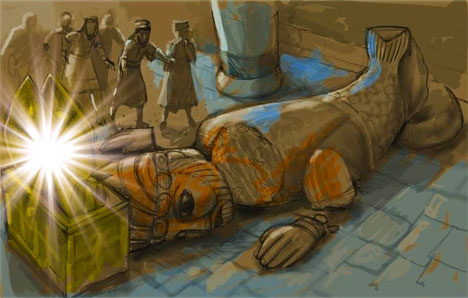A Bad Investment
 Tinpot Gods and Tinpot Men
Tinpot Gods and Tinpot Men
“Idolatry is the Bible Matrix rendered impotent.”
You get out of life only what you put in, or so the saying goes. According to the Bible Matrix, you are supposed to get out more than you put in.
The single grain of wheat that dies is supposed to bring an abundant harvest. A life is given to God in the faith that He will take what is given and turn it into an increase. This is also found in the Covenant pattern: “Who’s the boss?; who’s His representative?; what do I have to do?; what do I get?; and, what’s next? Obedience brings plunder; disobedience brings plagues. [1]
Idolatry is the Bible Matrix rendered impotent. It is a poker machine that never pays out, a Covenant foolishly made with a god who cannot produce the goods. In our day, this is all the -isms mentioned the other day (and see Ray Sutton on ethics versus magic in his book, That You May Prosper, quoted in Bible Matrix II: The Covenant Key.) It is men giving their all for tinpot men and tinsel ideologies that inevitably fail them. And shame them.
In the days of Jeremiah, it was lives and livestock given to tinpot gods. Instead of the sacrifices covering the people (as in The Day of Coverings, Atonement), that they might stand before God with heads lifted high, and minister to the world, the people would lie down, covered in shame. Peter Leithart writes:
Toward the end of a polemic against Judah’s idolatry, which occupies every hill and mountain and leafy tree, Jeremiah makes this comment: “the shameful thing has consumed the labor of our fathers since our youth, their flocks and their herds, their sons and their daughters” (Jeremiah 3:24). “Shameful thing” is bosheth, which could mean, abstractly, “shame.” Jeremiah follows with an exhortation to “lie down in our shame, and let our humiliation cover us” (v. 25). Shame is clearly an effect of idolatry. But in Jeremiah 11:3, the same word refers to an idol for which Judah sets up altars and to which they burn incense. In 3:24, the context supports the NASB translation as “shameful thing,” the shameful idol that causes shame.
Devotion to the shameful thing not only causes shame, but impoverishment. Quite literally, idols eat (‘akal) our labor and its products. All the time invested in raising sheep, oxen, goats literally goes up in flames when offered to a nothing. Sons and daughters pass through the fire, and all the invested hopes and energies are consumed. For Scripture, the same things offered to Yahweh are glorified and multiplied; not shame but glory is the product of sacrificing our labor to Him.
Our idols are as insatiable as ancient ones: Addictions, for instance, consume money, time, energy, life, children, marriages – and for what? The only product is humiliation.
Perhaps the prophet deliberately used the ambiguity of shame/shameful thing. [2] They would lie down in their idols, a slumber that was not God’s rest.
Lives offered to Christ bring a plunder for God that is eternal, even if the results are not seen in this generation or even in this life. We can offer him our “flocks and herds,” our sons and daughters, and our very lives, and see an increase of 30, 60 or 100 fold. Not only will we not be ashamed when we stand before Him, but He removes our shame now. The power of the accuser is the stigma of sin. In Christ, prostitutes and publicans, and even failed disciples, can lift up their heads, and minister to the nations. Jesus paid it all (mercy), and He keeps paying out (grace).
Creation – Transcendence – Sabbath
‘You shall call Me, “My Father,”
And not turn away from Me.’
Division – Hierarchy – Passover
Surely, as a wife treacherously departs from her husband,
So have you dealt treacherously with Me,
O house of Israel,” says the Lord.
Ascension – Ethics 1 – Firstfruits
A voice was heard on the desolate heights,
Weeping and supplications of the children of Israel.
Testing – Ethics 2 – Pentecost
For they have perverted their way;
They have forgotten the Lord their God.
Maturity – Ethics 3 – Trumpets
“Return, you backsliding children,
And I will heal your backslidings.”
…..“Indeed we do come to You,
…..For You are the Lord our God.
……….Truly, in vain is salvation hoped for from the hills,
……….And from the multitude of mountains;
……………Truly, in the Lord our God
……………Is the salvation of Israel.
……….For shame has devoured
……….The labor of our fathers from our youth—
…..Their flocks and their herds,
…..Their sons and their daughters.
(No Succession)
Conquest – Sanctions – Atonement
We lie down in our shame,
And our reproach covers us.
For we have sinned against the Lord our God,
We and our fathers,
From our youth even to this day,
And have not obeyed the voice of the Lord our God.”
There is no stanza 7 in this speech, no rest, no glory. Shameless Israel was devoured by shame.
_______________________________
[1] See Golden Emerods.
[2] For the prophets, language with a double meaning was a veiled blade. Ambiguous use of a word, done rightly, is the two-edged dagger of Ehud. In fact, Ehud announced that he had a dabar for Eglon, a Hebrew word which means “word,” or “thing.” Turns out it was a double-edged word, a physical “thing” that was not void. The blade went in and the machine paid out.

























